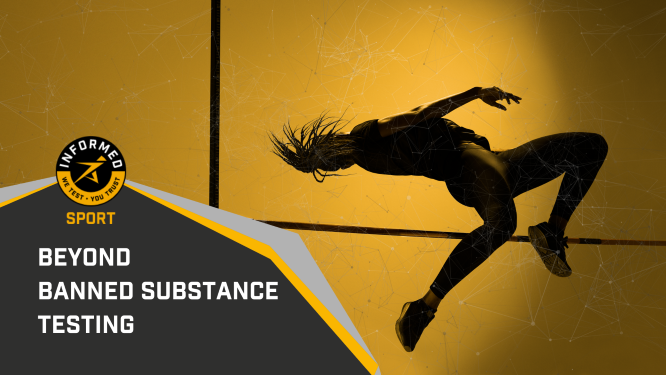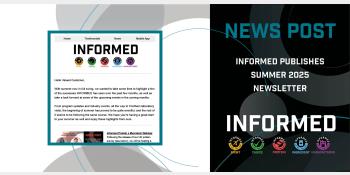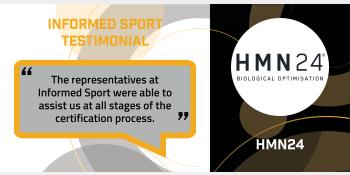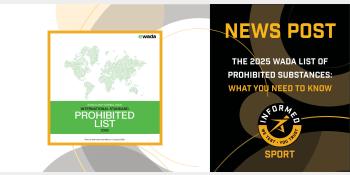INFORMED SPORT NEWS
Informed Sport: Beyond Banned Substance Testing

Informed Sport provides assurance to elite athletes, coaches, dietitians and the entire sporting community that their sports supplements have undergone the most robust testing for banned substances. By looking for the Informed Sport logo on a product’s packaging, or by searching on the Informed Sport app, athletes and coaching staff trust that, since every batch is tested, the supplement is safer for use. However, Informed Sport also provides assurance to supplement brands by providing an added level of quality assurance.
Many know about Informed Sport’s supplement testing. What is less known is the in-depth pre-certification process a product must also undergo alongside product testing. This includes a rigorous manufacturing and supply chain audit process that analyses the quality systems in place, raw materials, and cross-contamination prevention. Based on our research, the majority of inadvertent contamination occurs within the manufacturing process or from the supply chain. The pre-certification audit of these areas adds an extra level of assurance and minimises the risk of contamination.
When Informed Sport was launched in 2008, the industry was largely unaware of the cross-contamination issues within the supply chain that were present in the manufacturing process. In addition, brands may have been formulating products with botanical ingredients that contained naturally occurring banned substances. Because programmes like Informed Sport didn’t previously exist, reputable brands had no way of knowing of these contamination risks.
The Informed Sport programme provides supplement companies and manufacturers the ability to control the risks of banned substance cross-contamination and make better decisions about the ingredients used in their products.
Case Study: Manufacturing Cross-Contamination
A new brand was looking to certify one of its products with Informed Sport. As part of the process, production samples from previous batches were sent in for testing and the manufacturing audit process was about to begin. The samples provided failed the test for DHEA (dehydroepiandrosterone), a steroidal compound banned by the World Anti-Doping Agency (WADA). Since the product did not contain any botanical or high-risk ingredients, it was evident cross-contamination occurred somewhere in the manufacturing process or supply chain.
LGC conducted an investigation with the brand and manufacturer which included a manufacturing site inspection and swabbing of the facilities equipment. Of the 20 swabs taken, 17 of them came positive for DHEA. That’s 82%!
During the investigation it was discovered that the manufacturer had made a product with DHEA three months prior, but didn’t have robust enough cleaning procedures to get it out of the equipment, ultimately resulting in producing products that were contaminated with a steroidal compound.
As a result of the LGC investigation, remedial action was incorporated including enhanced cleaning techniques, raw material handling and elimination of banned substances in the facility. Periodic follow-up swabbing over a four-year period showed no signs of cross-contamination from LGC banned substance testing protocols. This was a case of a manufacturer not being aware of the contamination risk of handling high-risk ingredients and how difficult it can be to get out of the equipment.
Case Study: Raw Material Contamination
A brand certified with Informed Sport was certifying a product made in a new manufacturing facility. The registration samples provided tested positive for high levels of Methylhexanamine, a banned stimulant. As in all cases of contamination, LGC began the investigation process with the brand and manufacturer.
In this case, the audit process indicated the manufacturing facility had never handled banned substances, especially methylhexanamine and the product contained no stimulants. LGC focused its attention on the raw materials and tested each lot of each ingredient used in the product. Not surprisingly, it was determined that it was a raw material as the culprit. What was surprising was that it was not one of the active ingredients, but microcrystalline cellulose which is an excipient used to help the bulk material run through its equipment easier. The investigation showed that the raw material came from China and was manufactured in a facility with inferior control procedures. The production batch was destroyed and an expensive lesson was learned by the manufacturer to better audit their own supply chain and ingredient suppliers. This could have been any raw material purchased by a manufacturing facility if strict audits of their suppliers are not carried out.
Informed Sport. Why Risk It?
The above examples are just some of many that illustrate the likelihood of cross-contamination occurring through the manufacturing process and supply chain. They also highlight how critical a programme like Informed Sport is to the industry. Informed Sport works to continually provide education on contamination risks and what is required to minimise these risks through proper quality control procedures.
More than 325 nutrition brands worldwide have chosen Informed Sport to provide quality assurance to their customers and demonstrate trust with 1300+ tested, safer and certified supplement products.











